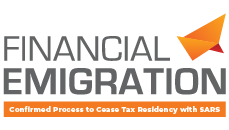For South Africans who have relocated or are planning to move abroad, ceasing tax residency is a critical process. It may sound simple enough, but for many this causes confusion about when, how and why.
So, Why the Confusion?
Many South Africans living abroad assume that simply leaving the country breaks their tax ties. However, SARS operates on legal requirements, not assumptions. Unless you have formally ceased tax residency, you remain a South African tax resident. If you are overseas and want to protect your worldwide income from taxation in South Africa, consider one of the following:
- Permanent cessation of tax residency through Financial Emigration
- Temporary cessation under a Double Tax Agreement (DTA)
- Use Section 10(1)(o)(ii) Exemption in the Income Tax Act (commonly referred to as the foreign income exemption).
These options apply in different contexts.
For those who left years ago, it may even be a question of “if” they have formally ceased tax residency. They may be under the impression that after many years of absence from South Africa, they are automatically off the SARS radar. This is not the case if you have not followed the formal process and the sooner you formalise your tax affairs, the better.
Financial Emigration
Physical emigration from South Africa does not equal financial emigration. The latter signals a permanent break from South African tax residency and involves formally applying to SARS that you no longer regard South Africa as your ordinary place of residence.
SARS applies the “ordinarily resident” test first: if South Africa is no longer the place to which you normally return, you may be seen as a non-resident. Your application requires documentation as evidence of your permanent intention to leave South Africa.
This is an ideal option for South Africans who do not have the intention of returning to the country and no longer have strong local family or economic ties.
When applying the “physical presence” test the Tax Man considers the number of days that a natural person must be present in South Africa during a year of assessment and also during the five years of assessment preceding the year of assessment under consideration. If you are present for 91 days in total during the year of assessment under consideration, for more than 91 days in total during each of the five years of assessment preceding the year, and for more than 915 days in total over those five preceding years, you will still be considered a tax resident.
Counting the Days
Taxpayers often confuse the days requirement of the physical presence test with the foreign income exemption. The Section 10(1)(o)(ii) Exemption in the Income Tax Act – often referred to as expat exemption – has different legislative requirements than the physical presence.
It is about days spent outside of South Africa and about the threshold before foreign earnings are taxed. The first R1.25 million of foreign employment income earned by a tax resident will qualify for exemption. Any amount above this will be subject to marginal tax rates in South Africa.
Before this exemption can be applied, requirements about days spent outside of South Africa and proof of an employment relationship must be met.
Residents working abroad temporarily and those not yet ready to cease tax residency, can use this provision for tax relief purposes. It is advisable to get guidance from a cross-border tax specialist.
Double Taxation Agreement
It is also a common misconception that expat exemption and tax relief under a DTA are the same, but the two serve different purposes in tax law.
A DTA is an international treaty between two countries, designed to avoid double taxation of income. The agreement specifies which country’s tax authority holds the right to tax you on your earnings. In other words, where you are a tax resident in one country and earning income in another, a DTA will determine taxing rights between the two countries concerned.
A DTA ensures limited exemption from South African tax on foreign employment income. This applies when an individual remains a South African tax resident but earns income from employment rendered outside South Africa like individuals on foreign work assignments or secondments.
In such instances expatriates can cease tax residency short-term as a temporary situation to protect their worldwide income from being taxed in South Africa, opposed to the formal financial emigration process which is a permanent cessation.
Having a DTA in place between South Africa and the country you find yourself in, does not automatically trigger tax relief. The following requirements may be considered: It requires a DTA residency declaration to be submitted and approved by SARS. This must be proved annually for you to still qualify for the relief.
Conclusion
Tax residency is not just a box-ticking exercise. It affects how much tax you pay, where you pay it, and how your offshore assets and income are treated. With cross-border tax increasingly scrutinised by SARS, South Africans abroad must get professional advice to choose the right option and remain compliant.










